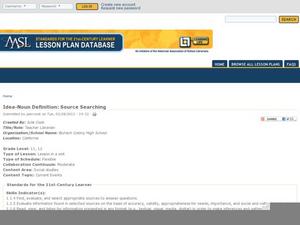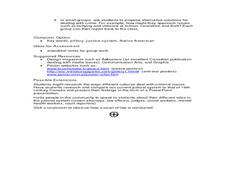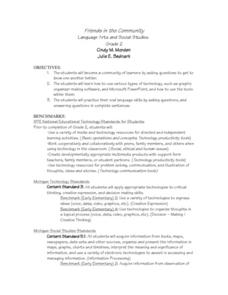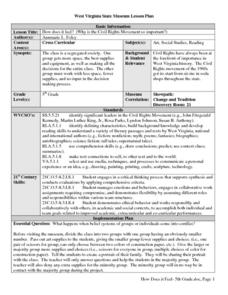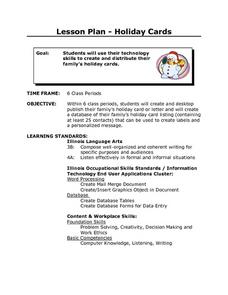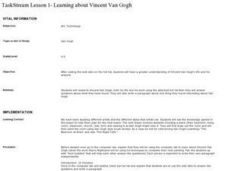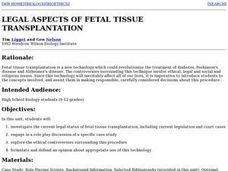Curated OER
Idea-Noun Definition: Source Searching
A great idea for showing language arts pupils the universality of themes, even in the real world! Have class members choose an idea-noun (peace, justice, war, love, etc.) at the beginning of the year or semester. They complete weekly...
PBS
Democracy in Action: Freedom Riders
This is a must-have resource for every social studies teacher covering the civil rights movement. Through an engaging video and detailed viewing guide, young historians learn about the Freedom Riders, and discover how everyday...
Curated OER
A Doctor's Dilemma
Students consider the bioethical dilemmas faced by doctors and write case studies about relevant issues within a particular medical decision.
Curated OER
Student And Teacher Behaviors In Science Classrooms
Students work in cooperative learning groups and respond to cases involving ethical choices by students and teachers in science classrooms. They create and submit additional cases and questions for use throughout the school year.
Curated OER
Legal Aspects of Tissue Transplantation
Students investigate the current legal status of fetal tissue transplantation, including current, legislation and court cases. They engage in role play discussion of a specific case study and explore the ethical controversies surrounding...
Curated OER
Technology Blackout Day
Students describe the impact of modern technology inventions on daily life. They create a graph of the class's favorite item of technology and draw a picture of their favorite piece of modern technology.
Curated OER
Elements of Biology: Genetics
Students study genetic manipulations and identify the solutions that could help to solve a problem. In this genetics lesson students divide into groups and research genetics for a debate.
Curated OER
Theories of Crime and Punishment
Students examine goals of two major theories of punishment, Utilitarian Theory and Retributive Theory, develop opinions about ethics and effectiveness of both theories, define legal duties of prosecutors and public defenders, and discuss...
Curated OER
Building Friendships
Students engage in four separate friendship-building activities. They develop social skills and ethical responsibility by role playing and interacting with each other through reading, art, music and dance.
Curated OER
Poetry and Our National Anthem
Middle schoolers express the meaning of the Star-Spangled Banner. In this American history lesson plan, students read through the national anthem and complete an activities from a list of choices. Some choices include: writing the anthem...
Curated OER
Art as Social Commentary
Students view artworks that make a statement about social conditions. They discuss the artworks, write about them and present their ideas to the class. They create socially conscious art pieces of their own.
Curated OER
Science Vocabulary
Students examine Science in present day life. For this oral communication lesson, students discuss and rank scientific events from least to most important. Students discuss their responses and why they are different....
Curated OER
Photo Forgery
Students inspect examples of manipulated photos and explore the technology and issues behind doctored photos. They hold an in-depth discussion about the responsibility of the photojournalist and news editor to show true photos.
Curated OER
Character Education Podcasts
Students study character traits. In this character education lesson, students create podcasts highlighting a particular character trait. Students broadcast one podcast per week.
Curated OER
Mandela The Man
Ninth graders explore civil rights by reading several biographies. In this Nelson Mandela lesson, 9th graders discuss the trials and tribulations Nelson Mandela had to face in South Africa and how they were similar to the problems Martin...
Curated OER
Race and Genetics: An Integrated Approach
High schoolers analyze racial issues related to the Human Genome Project. They participate in a mock symposium and write a reflection/position paper based on specific ethical principals.
Curated OER
Friends in the Community
Second graders build a classroom community by getting to know each other better. They ask classmates various questions and use graphic organizer software and Microsoft PowerPoint. Students practice their oral language skills while asking...
Curated OER
The Talk Show: A Bioethical Dilemma About Neurological Disorders
Students explore neurological societal problems. They research, collect information and assess the ramifications of ethical, economic, political, and social issues. During a talk show simulation, students present their decisions.
Curated OER
How does it feel? Why is the Civil Rights Movement so Important?
Fifth graders study the Civil War. In this US history lesson, 5th graders simulate what life was like during the Civil War by having two groups with one group given more materials than the other group. Students then draw a...
Curated OER
Holiday Cards
Students review basic computer skills needed to create a holiday card along with a database of at least twenty five contacts. They create their family greeting card including graphics, correct spelling an grammar. Using their database...
Curated OER
Learning about Vincent Van Gogh
Students conduct research on the life and artwork of Vincent Van Gogh. They explore various websites, answer research questions and write a paragraph about the information found online, and discuss as a class what makes Van Gogh's...
Curated OER
The Work of our (Divine) Hands
Young scholars explore ethical "mitzvots." In this philanthropy lesson, students consider how to lead their lives ethically according to the dogma of mitzvot. Young scholars discuss the consequences of their actions.
Curated OER
Genetic Testing for Disease Susceptibility
Learners explore how testing for particular genetic variations can help people to make decisions in lifestyle and health care choices. They analyze a Web-based case study, participate in class discussion, view video segments and...
Curated OER
Legal Aspects Of Fetal Tissue Transportation
Students investigate the current legal status of fetal tissue transplantation. Students engage in a role play discussion of a specific case study. Students explore the ethical controversies surrounding this procedure. Students formulate...


